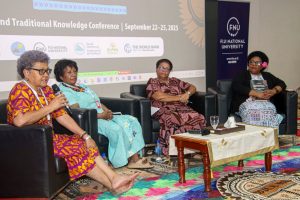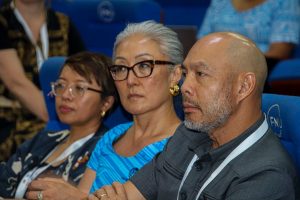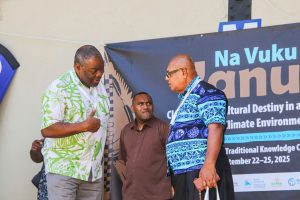

Honourable Ifereimi Vasu, Minister for iTaukei Affairs, officially opened the first day of the Na Vuku ni Vanua – Charting Our Cultural Destiny in a Changing Pacific Climate Environment conference, calling on Pacific communities to see relationships as their truest wealth and heritage.
The conference is underway at the Fiji National University (FNU) Bonunaqwele campus in Nadi from September 22 – 25.
Speaking to an audience of traditional leaders, knowledge holders, academics, and partners, Minister Vasu said the conference theme, “Nai Yau ni Vanua na Veiwekani – Relationships are My Wealth and Heritage,” is both a challenge and a commitment:
“Our wealth is not in the land alone, but in the way we relate to one another, within our vanua, across generations, and with the world. The strength of our relationships will determine how we stand together to face climate change, social disruption, and the challenges of our time.”
The Minister urged participants to approach the conference as a space of shared learning and discernment. “Let us renew the ties that bind us, defend the spaces between us, and prepare our young people, our future chiefs and leaders, to carry this knowledge forward,” he said.
Professor Unaisi Nabobo-Baba, Vice-Chancellor of FNU, opened with a strong call for intergenerational dialogue and cultural revitalisation. She spoke of the sacred duty to gift knowledge and build relationships that protect the future:
“Each one of you is a gift. Choosing to be here means you are convinced, metaphorically and literally, that you must gift your knowledge of traditional wisdom and climate resilience to the next generation. Our task is to serve each other so we can both survive into the future, not just as Indigenous peoples, but as humanity.”
She reminded participants of the power of chiefs and community leaders to provide direction. She urged young people to take up their place in the relational chain of survival.

Representing the World Bank, Senior Operations Officer Ms Suzy H. Yoon-Yildiz framed the conference as more than a dialogue:
“This gathering is a call for action. Indigenous and Traditional Knowledge systems are not relics of the past; they are living, evolving frameworks shaping resilience, sustainability, and well-being. We are committed to ensuring development pathways remain inclusive, equitable, and culturally grounded.”
Mr Miles Young, Director of SPC’s Human Rights and Social Development Division, reinforced the human rights dimension.
“This conference is a testament to the enduring value of Indigenous and Traditional Knowledge. Our collective efforts will shape policies, strengthen partnerships, and ensure our knowledge systems are respected, protected, and valued at all levels.
Over the three days, participants will explore how Indigenous and Traditional Knowledge can strengthen climate resilience, sustainable development, education, and social inclusion. Deliberations are expected to contribute to new policy pathways and intergenerational strategies that place culture and relationships at the heart of Pacific futures.
